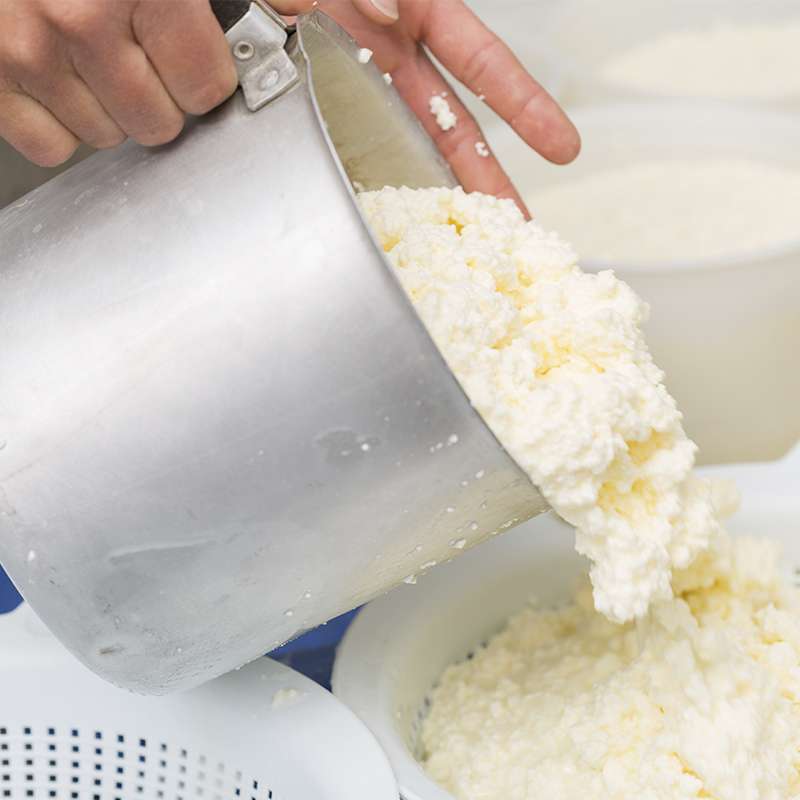What they use to curdle milk for cheese.
@rdcaruci (66)
July 24, 2019 1:06am CST
In my city to make cheese, a natural raw material is used, which is extracted by processing the stomach of the goat with whey, so that the rennet of the milk is achieved and the process is carried out.
I visited a city where they taught me how to do it, place the milk in a sealed plastic container, for three days in the sun.
If you dedicate yourself to making cheese, what do you use to curdle?
8 people like this
8 responses
@owlwings (43903)
• Cambridge, England
24 Jul 19
Cheese in England is very rarely made at home. It is nearly always made by specialist manufacturers, who may be either large factories or small independent businesses. Most cheese makers use rennet obtained from calves' stomachs to curdle the milk but there are vegetarian alternatives, I believe. That is only the beginning of the cheese making process. Here, the curds are separated and drained of the whey and then placed in a mould and kept at a controlled temperature to allow the bacterial culture (which is mostly what determines the character and style of the cheese) to act and produce the desired flavour. Depending on the type of cheese, the maturation period may be a month or so to over a year and all this time the cheeses are kept at the correct temperature and humidity and, often, wiped daily by hand.
The only kind of cheese which is sometimes made at home here (much less often than it used to be) is called 'cottage cheese' or 'cream cheese'. My mother used to make it and I have done in the past. No rennet is used for this. The milk is scalded and sometimes lemon juice is added, though my mother just left the milk to curdle naturally, which it will in a day or so. Then the curds and whey are poured in to a square of muslin to drain off the whey. My mother would tie the ends and hang the cheese in a shady place for a day or so until it stopped dripping, then she would take the cheese, add salt to taste and form it into a block on a plate. It was always used straight away as a spread on bread or toast, so it was quite different from the aged cheeses, such as Cheddar.
4 people like this

@owlwings (43903)
• Cambridge, England
24 Jul 19
@indexer Stilton was never made in Stilton (a small village near Peterborough in Cambridgeshire). It was actually made in a number of places and brought to Stilton (which was on the Great North Road) to be sold and taken to London. Today, the name 'Stilton' is a Protected Designation of Origin and can only be applied to the soft and creamy type of cheese, aged and with a hard rind, either blue or white, produced in Derbyshire, Leicestershire and Nottinghamshire. This means that, if you are a cheesemaker in Stilton, you cannot call your cheese (of whatever kind) 'Stilton Cheese'!
1 person likes this
@indexer (4852)
• Leicester, England
24 Jul 19
That's a very good summary. I live in a cheese-making area - a local cheesemaker is hoping to get permission before long to be a recognized maker of Stilton. However, the only cheese factory I have visited is the Wensleydale creamery in Hawes, North Yorkshire.
1 person likes this

@Miss_Leafy (4296)
• Colombia
24 Jul 19
I never think of making cheese by myself . I prefer buy it at the supermarket 

2 people like this
@rdcaruci (66)
•
24 Jul 19
@Miss_Leafy Of course, where I put it into practice, our rennet is of animal origin, since bacteria are obtained from the goat's stomach and whey, all are made by hand and we use sheep's milk and cow's milk in the mixture.
1 person likes this

@yanzalong (19038)
• Indonesia
24 Jul 19
Thank for info regarding how to make cheese.
1 person likes this

@yanzalong (19038)
• Indonesia
24 Jul 19
@rdcaruci It's okay; you will tell more later, I'd think.
1 person likes this
@rdcaruci (66)
•
24 Jul 19
@yanzalong Well, I really don't explain the whole process, that's just the beginning
1 person likes this


@Nakitakona (56469)
• Philippines
24 Jul 19
@rdcaruci We're looking forward for it. Thanks.

1 person likes this



@ravisivan (14082)
• India
24 Jul 19
Thanks. In India we do not make cheese at homes. We buy whenever needed---not regularly from shops. Good day.

@ravisivan (14082)
• India
25 Jul 19
@rdcaruci yes I understand possibly you get good quality cheese. that is nice

@franxav (14068)
• India
24 Jul 19
We use vinegar in our family. Then we tie the curdled milk in a white clean piece of cloth. Press the package with the grinding stone. After all water has been pressed out the cheese is ready.










 I might have the ideas of doing it.
I might have the ideas of doing it.


